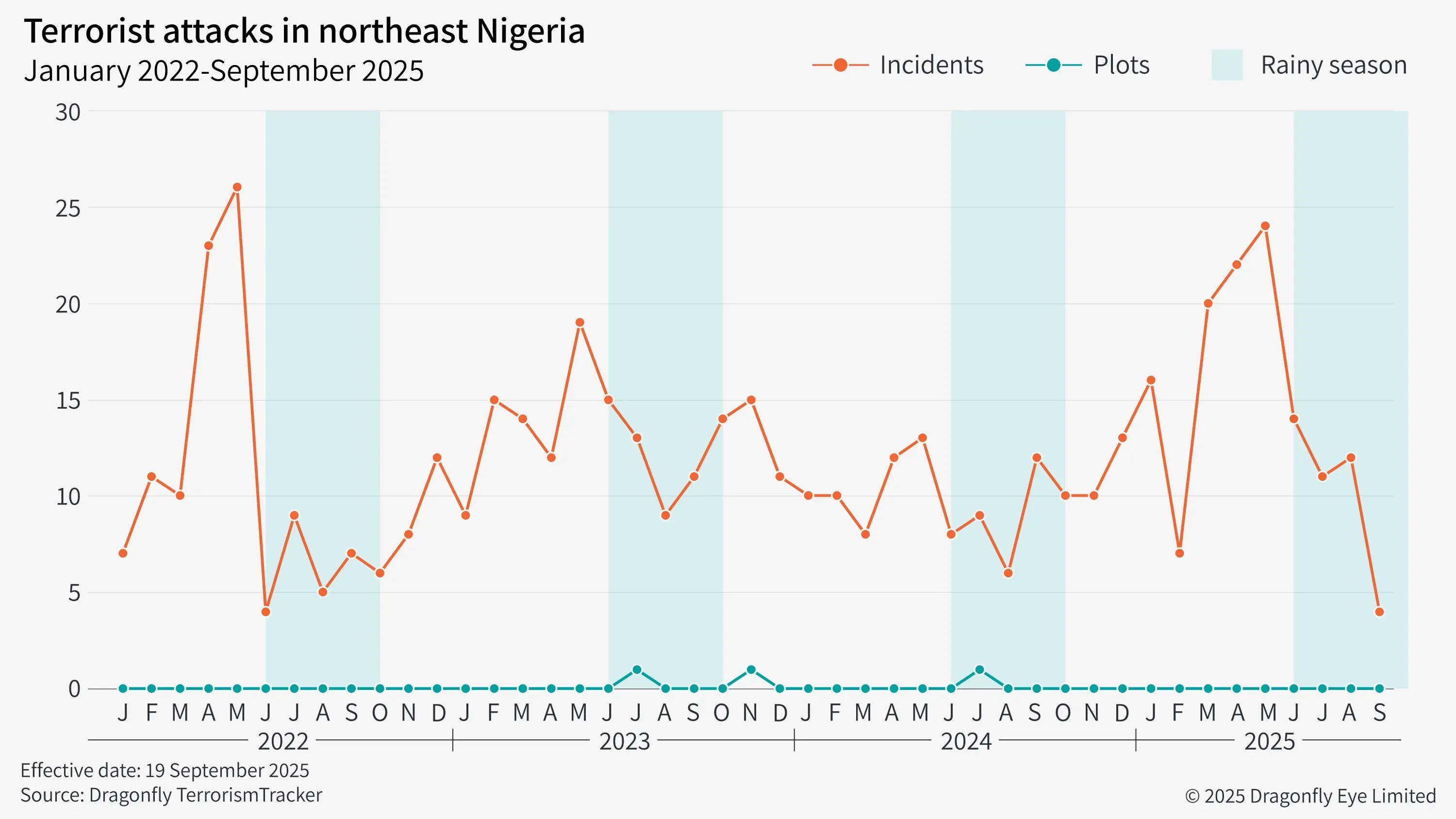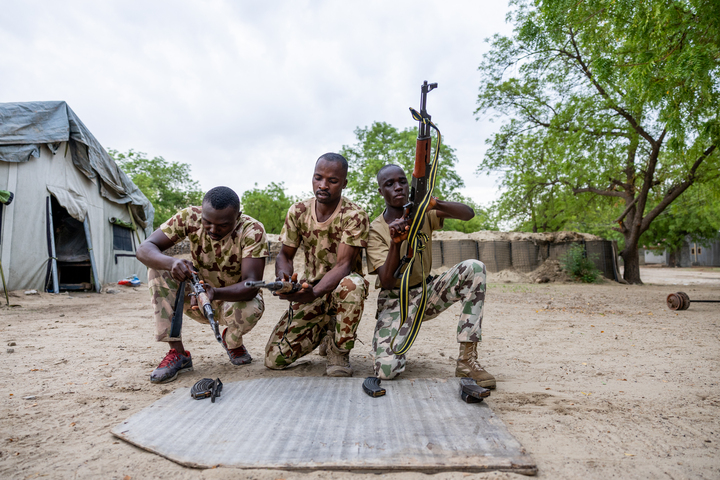
- Near-daily jihadist attacks are likely in northeastern Nigeria throughout the remainder of 2025, especially in Borno State
- These attacks have become more complex and brazen this year, including assaults by IS militants against military bases
- Rural roads connecting major urban areas, as well as isolated military bases, are probably high-priority targets for militants
We anticipate that there will be near-daily jihadist attacks in northeastern Nigeria during October and November as the rainy season comes to an end. Islamic State West Africa (ISWA) has been mounting more frequent attacks this year, including coordinated operations on military targets. Boko Haram continues to carry out indiscriminate attacks on civilians in Borno state, especially along roads.
The overall intent of both groups seems to be to undermine the control of the Nigerian government. To achieve this, ISWA almost exclusively attacks military sites and personnel. Meanwhile, Boko Haram has focused on civilian targets, such as attacking small villages and rural roads. This is highly likely to disrupt some humanitarian operations, especially due to the prevalence of roadside bombings in the region.
Heightened pace of attacks likely to continue this year
ISWA appears to have greatly increased the frequency of their attacks this year, according to our TerrorismTracker data. We recorded 87 attacks in the first six months of 2025, compared to 34 in the same period last year. The rise is at least in part due to ISWA’s reported expansion of its military capabilities with financial and manpower support from Islamic State’s (IS) central branch.
ISWA is also highly likely to try to expand recruitment this year. In May, ISWA released a propaganda video subtitled in Hausa; probably to appeal to local communities. Furthermore, high rates of poverty, which have worsened in recent years, are likely to facilitate ISWA recruitment. This is a common trend in the Sahel, where, according to a 2023 UN report, a lack of financial opportunities was the most common reason to join an extremist organisation. And this likely remains the case.
Following a sharp increase in the frequency of attacks in the region from February to May, jihadist groups carried out comparatively fewer attacks between June and August. This is likely due to the rainy season. We also assess that this is due to an intensification of counter-terrorism operations. The military reports having killed several hundred jihadists and degraded ISWA’s capabilities. Beyond sharing images of captured weapons, the military has not provided much evidence of these successes.
ISWA conducting more complex attacks
ISWA is conducting more brazen attacks against military targets this year. The group’s strategy has seemingly shifted since 2024, when it mostly carried out hit-and-run guerrilla attacks on convoys. This year it has mounted more complex attacks on fortified military bases. Militants have been using surveillance drones to coordinate ground assaults as well as conducting nighttime raids on isolated military positions using several hundred personnel.
Veteran fighters from the Middle East are now highly likely to be operating within ISWA’s ranks. The organisation’s recent tactic of raiding isolated military bases is similar to those previously used by Islamic State in Syria and Iraq. Furthermore, recent editorials and propaganda images show fighters who fought for IS in the 2010s in the Middle East in ISWA’s ranks. This influx of experienced fighters to ISWA has likely boosted the combat capabilities and influenced the tactics ISWA uses.
Boko Haram likely to continue attacks on civilians
Boko Haram does not seem to have enhanced its capabilities or changed tactics this year, unlike ISWA. Boko Haram is highly likely to continue to target civilians and conduct indiscriminate attacks. This includes mass killings, bombings at civilian sites like markets, and abductions. We doubt, however, that Boko Haram will increase the pace of its attacks from previous years. According to our data, the frequency of attacks has remained relatively consistent.
Boko Haram attacks are likely to disrupt humanitarian operations in the northeast. The group has conducted at least eight bombings this year on the highways surrounding Maiduguri. These do not seem to be targeted and occur on major thoroughfares, which have not been impacted by the rainy season. Due to the limited number of such roads in the region, roadside bombs are highly likely to impact operational movement and planning.
Attacks are likely outside Borno state
ISWA will probably attempt more attacks outside of Borno state this year, committing 9 already in neighbouring Adamawa and Yobe states. The Borno state governor has admitted that the military is ‘losing ground’ to jihadist groups, with the group now sufficiently established to attempt attacks elsewhere in northeast Nigeria. Our data shows there have been several incidents in northern Adamawa over the past few months, a location where we have not previously recorded regular attacks.
We assess that the military will largely be able to contain the threat to the northeast. The government has recruited 6,000 soldiers this year, intending to recruit 13,000 more. This will likely lead to an intensification of counter-terrorism operations. However, based on past recruitment drives, it is unlikely to slow the pace of attacks. In the long term, the authorities seem to lack initiatives to counter jihadism. And it does not appear to be addressing the poverty that groups exploit for recruitment.
Nigerian soldiers from the Multinational Joint Task Force (MNJTF) assemble their assault rifles during training at the MNJTF military base, Sector 3 Headquarters, in Monguno, Borno state, Nigeria, on July 5, 2025. Twelve checkpoints manned by the Nigerian army control the various entrances to Monguno. Monguno’s huge fortifications have kept the garrison town mostly secure even as northeastern Nigeria has seen a recent surge in attacks on military bases by jihadists fighting a grinding 16 year war. Fighting in Borno may have eased since the conflict’s highpoint in 2015 as jihadists have been forced back. But militants from Islamic State West Africa Province or rival Boko Haram have attacked or temporarily overrun a dozen military bases since the start of the year. (Photo by Joris Bolomey / AFP) (Photo by JORIS BOLOMEY/AFP via Getty Images)




